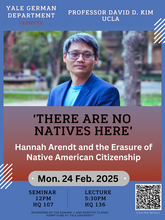’There Are No Natives Here’ Hannah Arendt and the Erasure of Native American Citizenship, with David D. Kim
Schedule of Events:
Seminar 12:00pm - HQ 107
Discussion with David D. Kim about the most central chapter of Hannah Arendt’s Origins of Totalitarianism, “The Decline of the Nation-State and the End of the Rights of Man”. Students have the opportunity to understand more deeply the historical context within which Arendt develops her insights into Jewish refugees and citizenship rights. They are also welcome to raise other questions about Arendt. The reading will be made available digitally upon registration and students are encouraged to read it before attending the seminar.
Lecture, 5:30pm - HQ 136
At the height of the Cold War, Arendt mapped out America’s exceptionalism in a world of nation-states. In On Revolution, she presented a moving account of this country as a consent-based republic founded by enlightened heroes. But it drowned out the cognitive dissonance of fighting for political freedom without abolishing chattel slavery. So how far did this contradiction go? What cultural memory did she adopt to promulgate the notion that America was held together by consent and compliance as opposed to coercion and conformism? What did she do with American Indians whose history was dominated by conquest and suffering? The aim of this lecture is to examine Arendt’s erasure of Native American citizenship. It is based on Kim’s Arendt’s Solidarity: Anti-Semitism and Racism in the Atlantic World (link is external) (link is external)(Stanford University Press, 2024).
David D. Kim is Professor in the Department of European Languages and Transcultural Studies and Associate Vice Provost at the International Institute at the University of California Los Angeles.
Professor Kim’s scholarly interests range from postcolonial, global and migration studies and community engagement to human rights, cosmopolitanism, solidarity and global literary histories. His most recent book Arendt’s Solidarity tracks various manifestations of this concept in the political theorist’s archival documents, publications, and recordings. His other monograph is Cosmopolitan Parables (link is external) (Northwestern University Press, 2017). It investigates how German writers represent memories of colonialism, Nazism, and communism in the post-Cold War world as cross-referential, cosmopolitan entanglements. His edited books include Globalgeschichten der deutschen Literatur (link is external) (Metzler Verlag, 2022; co-edited with Urs Büttner), Reframing Postcolonial Studies (link is external) (Palgrave Macmillan, 2020), The Postcolonial World (link is external) (Routledge, 2016; co-edited with Jyotsna Singh), Imagining Human Rights (link is external) (De Gruyter, 2015; co-edited with Susanne Kaul), and Georg Simmel in Translation (Cambridge Scholars, 2009). His peer-reviewed articles have appeared in The German Quarterly, Monatshefte, Gegenwartsliteratur, Journal of Translation Studies, and Jahrbuch der Deutschen Schillergesellschaft.
*Please Note: Registration is required for the noon seminar, taking place on Monday, 25 February, at noon, HQ 107. Please sign up here: https://forms.gle/4trPrx4yytJSNEkE6 (link is external).
